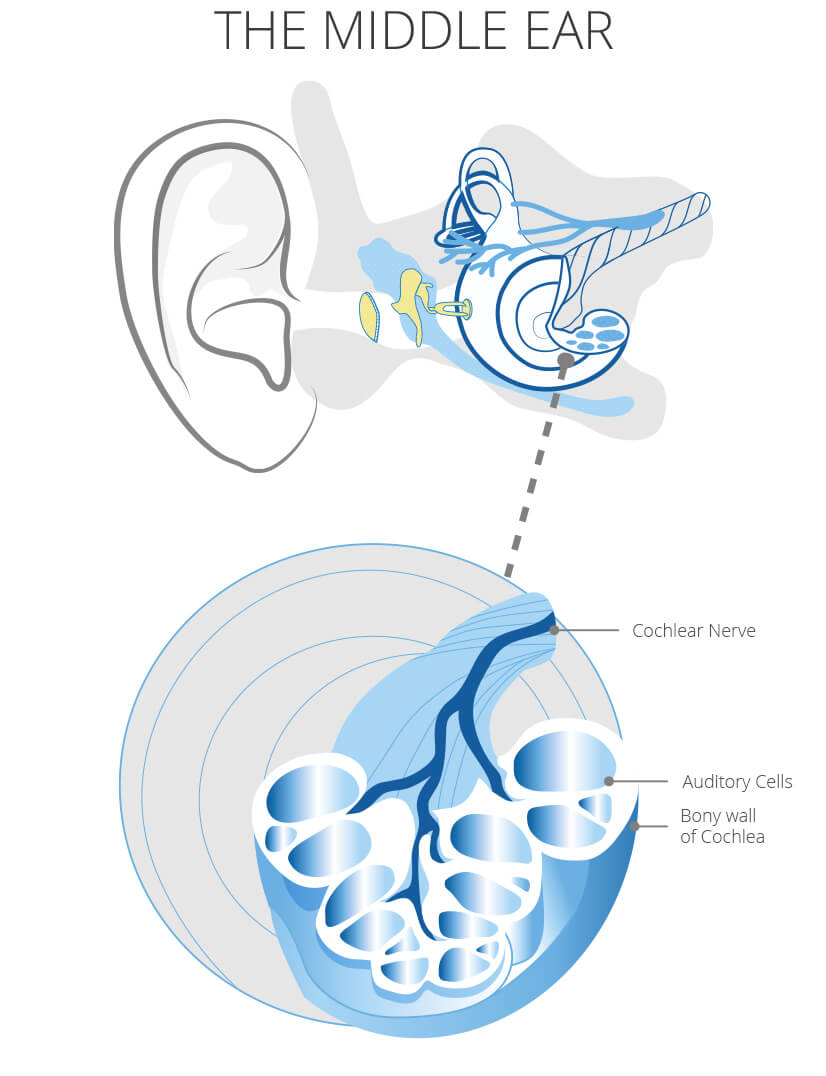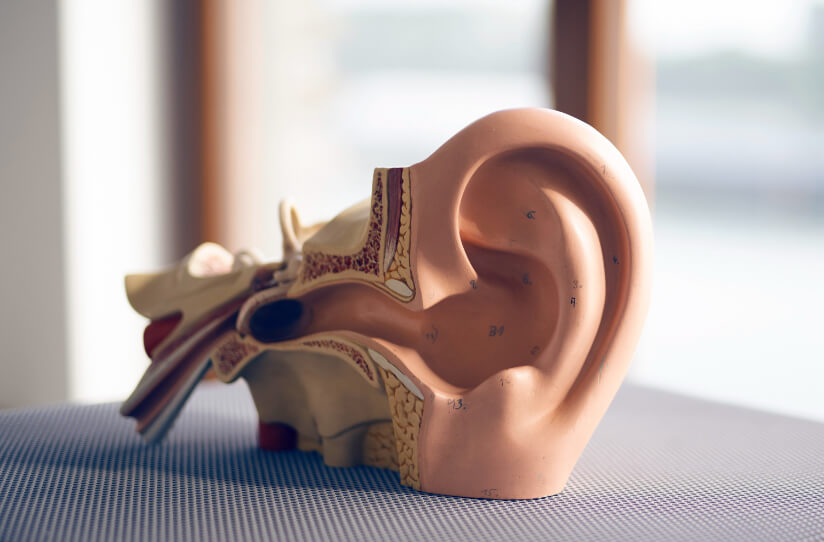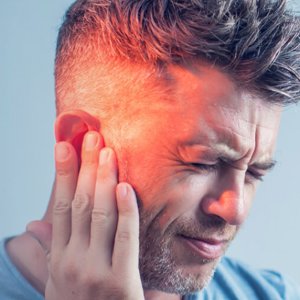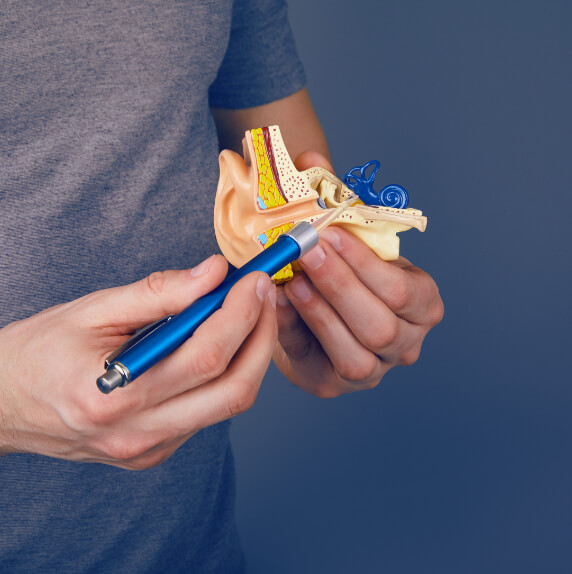
What is sudden hearing loss?
A sudden hearing loss is a mostly one-sided disturbance of sound perception that affects the inner ear. The manifestation differs from case to case and is still a mystery to medicine, as the cause cannot be clearly identified.
A sudden hearing loss can be mild or lead to complete hearing loss. It also happens that a sudden hearing loss occurs together with tinnitus. If you suspect a sudden hearing loss, you should immediately consult a doctor and clarify the symptoms. If your sudden hearing loss has lasted for a long time and has led to a deterioration in your hearing, modern hearing aids will help you to effectively compensate for this.
Table of Contents
- Sudden hearing loss symptoms
- How long does a sudden hearing loss usually last?
- Sudden hearing loss and tinnitus
- Sudden hearing loss treatment
- Sudden hearing loss and hearing aids
- Causes of sudden hearing loss

What are the symptoms of sudden hearing loss?
- Dizziness
- Sensory disturbance in the outer ear
- Ear pressure
- Tinnitus
- Sudden occurrence with no apparent cause
- Earache
- Seizures
- You can hear from one ear only
How long does a sudden hearing loss last?
A very important factor in the therapy of sudden hearing loss is time. The prognosis depends heavily on the time lag between the onset of symptoms and the start of the rheological treatment. Appropriate therapy, which should be started within the first hour at best, but no later than the first week after the onset of symptoms, largely restores the ability to hear. If the hearing ability continues to deteriorate, or if there are more issues with balance, the prognosis can worsen. Almost two-thirds of the patients recover completely. In the remaining patients, hearing loss and/or ear noises remain.
Is hearing loss the same as tinnitus?
Numerous parallels in symptoms and clinical pictures suggest that sudden hearing loss and tinnitus are one and the same. But that’s not true. Acute hearing loss itself is assigned to the conditions, while tinnitus is a symptom. However, tinnitus can often occur in combination with a sudden hearing loss. It is also possible that tinnitus may persist after the sudden hearing loss is resolved. In this case, experts speak of chronic tinnitus. However, this is not always related to sudden hearing loss.
How does sudden hearing loss occur?
The exact causes of sudden hearing loss are not known. There are, however, a few theories that are considered likely in ENT medicine. Blood flow to the inner ear is reduced in the event of a sudden hearing loss. The main trigger for this can arise from stress. A hectic environment or high time pressure on work can lead to circulatory disorders, which ultimately lead to sudden hearing loss.
How can you diagnose sudden hearing loss?
The diagnosis of sudden hearing loss is determined according to current medical standards using an elimination process. The ENT doctor can use an ear microscopy and hearing test to narrow down whether it is a sudden hearing loss or another condition. Various examination methods (e.g. blood pressure measurement, blood tests, ear microscopy, or ultrasound and magnetic resonance examinations) are used for further clarification. For example, the ENT doctor can use an ear mirror to determine whether other external features such as blockages and injuries in the ear canal can be ruled out. Using hearing tests (tuning fork test, tone audiometry, and speech audiometry), the doctor determines the degree and location (inner or middle ear) of the hearing loss. The division of a sudden hearing loss into high, mid-range.
An important component of diagnostics is anamnesis, the medical history. In this, the doctor learns important information that is indicative of a sudden hearing loss and the possible cause. If the previous history does not provide any specific indications of sudden hearing loss, there are other methods of special diagnosis in the event of sudden hearing loss. Fowler’s tone audiometry, brain stem audiometry (BERA), or the measurement of otoacoustic emissions (OAE) are used. These examinations serve to rule out a condition of the auditory nerve as the cause of the hearing loss.
How can you treat a sudden hearing loss?
Time plays an important role in therapy: the earlier the therapy begins, the better the prognosis. In the best case scenario, sudden hearing loss is treated by an ENT doctor or an ENT clinic within the first 24 hours.
The blood flow to the inner ear must be promoted and possible triggers eliminated. Here are the most common forms of therapy that are used in the event of sudden hearing loss:
Administration of blood circulation-enhancing (rheological) drugs
In the event of a sudden hearing loss, the blood flow to the inner ear is reduced or disturbed. The blood supplies the inner ear with the necessary nutrients and is also responsible for the removal of the same. The hair cells of the auditory organ are permanently damaged if the blood flow continues to be impaired. The blood circulation can be improved again by the administration of medication that stimulates the blood flow. Cortisone can also be used to prevent swelling (anti-edematous therapy)
Therapy with local anesthesia to block blocked nerves
Local anesthetics such as procaine and lidocaine are often used in the event of sudden hearing loss (inotropic therapy). Their administration blocks nerves that can lead to narrowing of vessels. In any case, this should be done under clinical observation by a doctor.
Hearing aids as therapy for persistent sudden hearing loss.
If the sudden hearing loss persists, it means that the sensory and hair cells are damaged. The result is permanent hearing loss, which can be compensated for using hearing aids. If the sudden hearing loss has been present for a longer period of time or if it occurs in connection with tinnitus, a hearing aid with a masker should always be used.
Treatment in an oxygen pressure chamber
There is also the option of therapy in an oxygen pressure chamber (hyperbaric oxygen therapy). This method has proven to be very effective, but is not considered a clearly effective treatment according to the criteria of evidence-based medicine.
Therapy for particularly severe cases of sudden hearing loss
If the sudden hearing loss is particularly severe, treatment by means of blood washing (apheresis) is considered. The procedure is specifically called Heparin-induced extracorporeal low-density lipoprotein (LDL) precipitation (HELP). This cleanses the blood of substances that promote blood clotting. Blood flow properties (and thus the blood circulation) are thus improved. In severe cases, inpatient therapy must be started, but outpatient treatment by a specialist is usually possible.
Treatment of obesity and diabetes
The treatment of risk factors for arteriosclerosis (such as high cholesterol levels or diabetes) is of great importance in the long term. If you are overweight, reducing your weight in combination with a low-fat diet and exercise can promise improvement. Good control of blood sugar should be ensured in diabetics. Nicotine, coffee, and alcohol should be avoided.
Alternative forms of therapy
There are also alternative forms of treatment, but their effectiveness has not been scientifically proven and their use is therefore not an issue in conventional medicine and is rejected.
How do hearing aids help with a sudden hearing loss?

- If hearing does not return after a sudden hearing loss, hearing aids compensate for a hearing loss.
- If a sudden hearing loss occurs with tinnitus, hearing aids with a “masker” can alleviate its symptoms.
- Hearing aids train the hearing and help the brain not to “unlearn” important tones.
- The sooner you use a hearing aid, the sooner severe hearing loss can be avoided.
Causes of a sudden hearing loss
Circulatory disorders of the smallest vessels (microcirculation) in the inner ear are probably responsible for the causes of a sudden hearing loss. There is limited knowledge about why hearing loss occurs. However, it generally occurs due to the following factors:
- Stress
- Virus infections or reactivations (e.g. herpes or chickenpox)
- Atherosclerosis and the resulting circulatory disorders
- Metabolic conditions like diabetes or high cholesterol
- Rupture of the round or oval window
- Cervical spine conditions (e.g. whiplash)
- Increased platelet aggregation
- Closure (thrombosis) of the inner ear vessels
- Autoimmune conditions
- Previous acute otitis media
Idiopathic sudden hearing loss
Idiopathic means “without an identifiable cause”. This is the most common situation. It occurs suddenly and an organic cause cannot be found after thorough investigation.
Sudden hearing loss caused by stress
Stress is a common trigger for sudden hearing loss. It is believed that the stress hormone adrenaline causes the small blood vessels to cramp. However, the exact pathogenesis – i.e. how the sudden hearing loss occurs – is not known. If you have suffered a sudden hearing loss, it is imperative that you learn to live your life with less stress and thus less overwhelming demands. Exercising regularly can help relieve stress.





